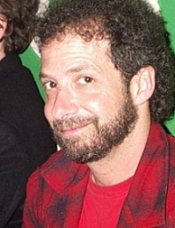 There
were several other performers -- first rate performers -- who went ahead
of us, most notably Paul Zollo (pictured) and Jeff Gold. Both of them are
superb singer/songwriters who've been on the LA scene for a very long time.
Paul, who's also an author, used to work with me at NAS. Before the show,
I went back to talk to them and I asked them who was going first. They
said, "We're NOT following YOU!"
There
were several other performers -- first rate performers -- who went ahead
of us, most notably Paul Zollo (pictured) and Jeff Gold. Both of them are
superb singer/songwriters who've been on the LA scene for a very long time.
Paul, who's also an author, used to work with me at NAS. Before the show,
I went back to talk to them and I asked them who was going first. They
said, "We're NOT following YOU!"
Then, after Bobby's and my
set,
Paul Marshall,
an original member of the Strawberry Alarm Clock -- Anyone remember "Incense
& Peppermints?" -- got up and said, "How am I supposed to follow Steve
Schalchlin?" Suddenly I felt like Shawn
Decker radiating positoid energy.
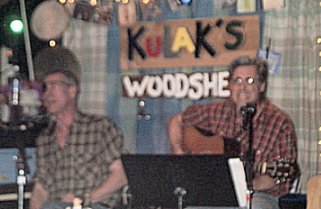 I
was a little uncomfortable because the piano faced the wall away from the
audience. I like being able to see the audience so I spent the who concert
singing while looking as far left as possible. But from the first note,
every eye was on us and I felt like we totally kicked ass.
I
was a little uncomfortable because the piano faced the wall away from the
audience. I like being able to see the audience so I spent the who concert
singing while looking as far left as possible. But from the first note,
every eye was on us and I felt like we totally kicked ass.
For instance, we added a
funky guitar rhythm to "James Robison." Anyway, the set list was "Where
Is God," "Somebody's Friend," "Near You," "Beyond The Light," "Salvation
Song," "James Robison," "Going It Alone," "Friendly Fire," and then "William's
Song."
After it was over and we
were in the car driving home, we were SHOUTING at each other at how much
fun we had just being up there playing and singing. Man, it felt good.
Oh, and Lisa Bobesckhklsisko flew all the way from Seattle so it was GREAT
cuz the whole family said hi first and then they brought her out!
EL PORTAL:
My life has significantly
changed since I started volunteering at El Portal. The basic problem of
the place is that, since they don't have any money, a lot of the staff
that had been there a long time, is gone. And there's a lot to keep track
of.
The reason I'm there is because
Jimmy was just becoming overwhelmed with it all. I was fearing for him
mental health. So he has brought me in as a kind of -- well, today he called
me his "chief of staff."
Three stages, a complicated
box office system, money to raise, a Board to satisfy, begging for money
to get the new show up, needing to plan the next season, about 80 actors
in a resident company (just to scratch the surface). It's a lot. So this
week I decided to start from scratch and interview as many people as possible
and learn the whole history of this theatre.
I feel incredibly happy and
energized by this challenge. Knowing that I'm helping Jimmy and that he
trusts me is the first thrill. The second thrill is that since I've run
non-profits before, I'm not afraid of it.
Today, when Karen Reed, who's
in charge of membership, told me about the structure they'd dreamed of,
where the older actors give classes to the younger actors -- and everyone
has access to the stages to learn their craft -- I fell immediately in
love. Yeah, I'd heard there were classes but I didn't actually understand
it in the whole scheme of things. Back at National Academy of Songwriters,
my job was to hold workshops and seminars and showcases for new songwriting
talent. I've been missing that energy. Y'know?
So maybe this is really fate.
That is, if they can keep the doors open, of course. It feels to me like
a new beginning. Reader, I'm going to take you with me as we venture into
exotic territory.
Hm. A historic theatre, an
acting company filled with all ages, sizes, shapes and colors, a crazy
office, the drama of fundraising! The make-up, the lights!! Sounds like
the opening premise of a TV series. Hm. If the writers go on strike out
here, will it be illegal for me to keep my diary?? Well, what if my diary
starts to sound like "West Wing" set in a struggling theatre in North Hollywood
California?
Hey, we're on to something
here.

![]()
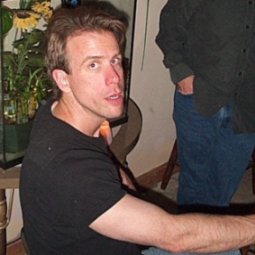
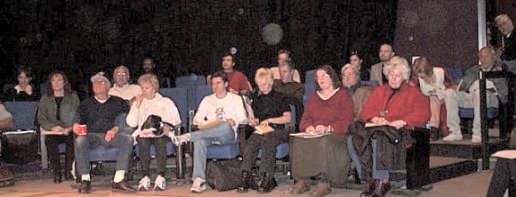
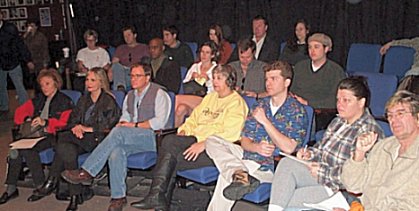
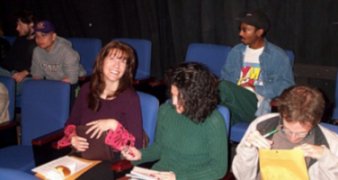
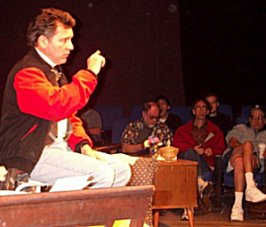 Then
the President of Actors Alley, Henry LeBlanc, brought up the need for various
committees to assist Jim and Pegge in the office and around the theatre.
Things like a publicity committee, box office committee, office committee,
etc. So that became our first step: Finding out who could and would help.
Then
the President of Actors Alley, Henry LeBlanc, brought up the need for various
committees to assist Jim and Pegge in the office and around the theatre.
Things like a publicity committee, box office committee, office committee,
etc. So that became our first step: Finding out who could and would help.
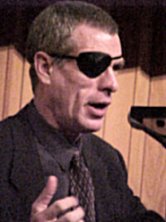
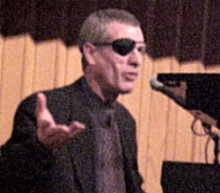
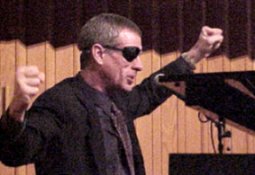
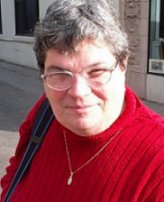 Staying
again at Ken McPherson's place in San Francisco, Bev (sporting a foxy new
haircut) drove down from Davis, picked me up in her car and we drove down
to Palo Alto, about 45 minutes away. It's always fun to spend time with
Bev. She makes me laugh. She's one of those friends with whom you can say
ANYTHING about ANYTHING, no matter how rude. Oh, and not about others.
We basically slice each other up unrelentingly.
Staying
again at Ken McPherson's place in San Francisco, Bev (sporting a foxy new
haircut) drove down from Davis, picked me up in her car and we drove down
to Palo Alto, about 45 minutes away. It's always fun to spend time with
Bev. She makes me laugh. She's one of those friends with whom you can say
ANYTHING about ANYTHING, no matter how rude. Oh, and not about others.
We basically slice each other up unrelentingly.
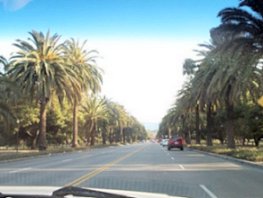
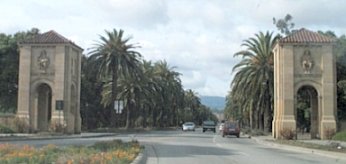
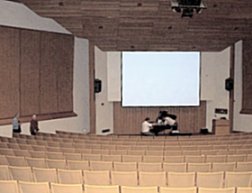
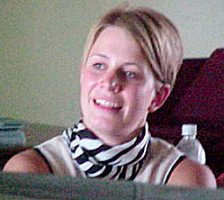
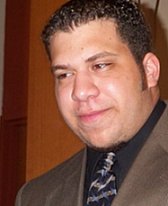
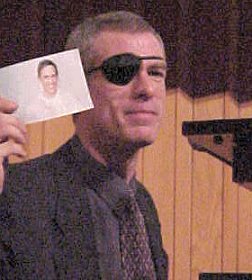 My
place on the program was to represent the patient. A person who (essentially)
wrote about his own death and then came back from the brink. I told them
how my one desire at "the end" was to not be forgotten -- and then, dramatically
(and absolutely spontaneously), I whipped out the picture of Dickie I carry
in my pocket. "One of my best friends died a year ago January but I carry
his picture when I sing so he is always with me."
My
place on the program was to represent the patient. A person who (essentially)
wrote about his own death and then came back from the brink. I told them
how my one desire at "the end" was to not be forgotten -- and then, dramatically
(and absolutely spontaneously), I whipped out the picture of Dickie I carry
in my pocket. "One of my best friends died a year ago January but I carry
his picture when I sing so he is always with me."
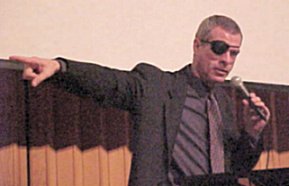
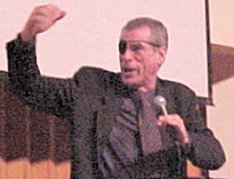
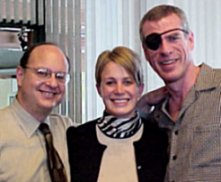
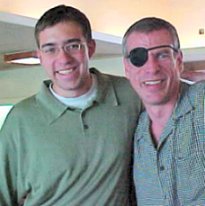
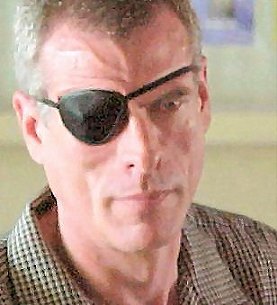 Weekends
like this are a treasure to me. Not only do I get to meet great physicians
and other nurturers, but I get a chance to thank them for caring about
their patients. As one doctor said, the worst thing that has happened to
modern healthcare is the devaluation of doctors into "health care providers"
-- as if doctors and nurses were equally replaceable parts in some big
machine.
Weekends
like this are a treasure to me. Not only do I get to meet great physicians
and other nurturers, but I get a chance to thank them for caring about
their patients. As one doctor said, the worst thing that has happened to
modern healthcare is the devaluation of doctors into "health care providers"
-- as if doctors and nurses were equally replaceable parts in some big
machine.